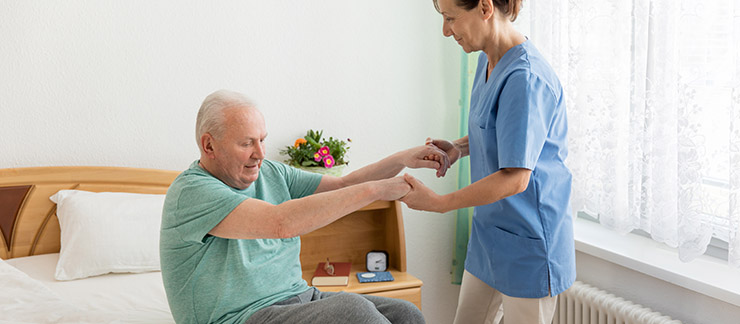
How to Prevent Elderly Loved Ones from Getting Bed Sores
If you are caring for an older adult who is confined to a bed or who uses a wheelchair, you may have been advised to watch out for bed sores. While “bed sores” may not sound dangerous, they can be painful and have the potential to lead to serious complications such as infection or non-healing wounds.
Elderly people who are confined to beds or are wheelchair-dependent need help to prevent bed sores, which can negatively affect their health, well-being and overall quality of life.
What is a Bed Sore?
Bed sores, also known as “pressure or decubitus ulcers,” are injuries to the skin and underlying tissue that are caused by prolonged pressure.
Bed sores often occur over bony areas of the body, such as the:
- Tailbone
- Heels
- Hips
- Ankles
People who are required to spend a lot of time in bed can experience bed sores on:
- Sides and back of the head
- Shoulder blades
- Lower back
- Backs of the knees
People who use a wheelchair tend to develop bed sores on
- Buttocks
- Spine
- Shoulder blades
- Backs of the arms and legs where they rest against the chair.
Early signs of bed sores may include:
- Swelling or changes in skin color or texture
- Temperature differences in an area of skin
- Pus-like draining
- Tender areas
In addition to movement limitations, wheelchair use, and prolonged time in bed, risk factors for developing bed sores include:
- Incontinence
When exposed to urine or feces, the skin can become vulnerable to bed sores. - Loss of sensation
Decreased sensation can lead to people not recognizing the need to reposition. - Poor blood flow
Skin and tissue may not receive the necessary amount of oxygen and nutrients from the bloodstream to stay healthy. - Poor nutrition or hydration
Proper dietary nutrition and hydration keep the skin robust and healthy.
When a bed sore develops, it can lead to serious complications, including infection of the skin, bone, or joints as well as sepsis, a life-threatening response to infection.
If you suspect your loved one has developed a bed sore, be sure to bring them to a doctor for proper diagnosis and treatment.
How Can You Prevent Bed Sores in the Elderly?
Preventing bed sores in your elderly loved ones is vital to maintaining quality of life and avoiding additional health complications. The two main strategies to prevent bed sores are repositioning and skin care.
Repositioning is key for relieving the prolonged pressure that can cause bed sores. Try to do the following:
- Reposition your loved one every 1–2 hours or sooner if they feel uncomfortable. When repositioning, always be sure to lift and not drag, as this can damage the skin.
- Make sure cushions or mattresses are made of pressure-relieving materials like foam, or is a model filled with gel or air. Also, place foam or gel pads between your loved one’s knees and ankles when lying on their side, and beneath the heels, tailbone, calves, elbows, shoulders, and shoulder blades when lying on their back. Avoid using a donut-shaped cushion, as this can place extra pressure on the surrounding tissue.
- Avoid raising the elevation of the head of your loved one’s bed more than 30 degrees. This helps prevent them from sliding down the bed and injuring their skin.
- Have the fit of your loved one’s wheelchair checked by a doctor at least once per year, or more often if they feel uncomfortable, to prevent excess pressure.
Proper skin care will keep skin robust and healthy and less prone to developing bed sores. Make sure you focus on:
- Inspecting your loved one’s skin daily for warning signs of bed sores, and always check the areas of skin where they commonly develop.
- Washing skin with a soft sponge or cloth and a gentle cleanser. Scrub lightly and always pat dry to avoid accidentally injuring the skin. If your loved one is incontinent, be sure to clean away urine and stool frequently.
- Applying moisturizing creams and skin protectants daily, especially to areas that are prone to bed sores.
Caring for an elderly loved one who is confined to bed or who uses a wheelchair can be difficult, in part because proper patient handling is physically demanding. If you’re having trouble caring for your elderly loved one, consider working with a qualified home care worker to help prevent bed sores and improve your loved one’s quality of life.
